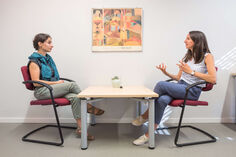Mobbing&Du (Bullying&You)
Section of Translational Psychobiology in Child and Adolescent Psychiatry
Project description
Bullying is a form of peer-to-peer maltreatment and deserves a high level of attention and efforts in order to counter and prevent it. It is a common phenomenon among children and adolescents, with roughly one in four students reporting being affected. The negative impact of bullying is complex: emotional, social, cognitive and behavioral, and the victimization experienced increases the risk of a wide range of mental disorders (depression, anxiety, self-harm, suicidality, somatic complaints, etc.). Bullying occurs in all social classes, in all types of school and schools of all sizes. The PISA study (2015) showed that the learning climate at schools with high bullying rates is negatively affected for everyone and that overall academic performance is poorer. Teachers often feel overwhelmed by the topic because they lack strategies for dealing with the problem. Acute cases of bullying demand a high amount of time, the often ineffective handling of the topic leads to frustration and imposes a burden on the teachers' health.
The prevention program Mobbing&Du is based on the following basic ideas:
- Bullying is an emergency and requires action.
- With Mobbing&Du, each individual is supposed to be reminded of their role and responsibility in the bullying process. Because bullying is never just a matter of perpetrators and victims of bullying, but rather of the whole group contributing to maintaining it. But by becoming aware of it and taking action, everyone can do something about bullying!
- The program involves all teachers and students in grades 3 to 9. It enables them to detect, to stop and to prevent bullying.
- Mobbing&Du is adapted to the schools' needs
a) Limited time resources
b) Required security of how to take action
c) Individuality
By using the so-called “blended learning” approach, Mobbing&Du strives to combine the advantages of face-to-face events and e-learning. The digital components of the program include opportunities for exchange via Moodle forums, a mailbox for reporting bullying incidents and student surveys in addition to e-learning lessons for teachers and students. The analogue components of the program offer teachers concepts for intervention, case documentation and break supervision as well as a kick-off event and a practical lesson. On request, an educational day can be held on site. The offer is complemented by class meetings and project days for students as well as a brochure for parents. An in-house core team of four to six teachers of an individual school serves as a directing force and is in charge of setting up and maintaining the program. A team of experts from the child and adolescent psychiatry is available to provide advice.
After the initial implementation phase, Mobbing&Du can be easily and permanently integrated into everyday school life. Primary as well as secondary schools can apply for the program at any time and join it flexibly. Participation in the program is free of charge for the time being.
A randomized, controlled intervention study (RCT) is planned to be carried out over a period of one year to evaluate the program. For this purpose, 40 schools are being recruited, 20 of which will start the program immediately (experimental group), while 20 will start with a one-year delay (waiting control group). The evaluation is based on anonymized student surveys at baseline and after one year (postline) as well as on additional surveys of the core team and on the collection of various objective measures (online activities).
Contact
In order to learn more about Mobbing&Du, please get in touch with the program coordinator:
Vanessa.Jantzer@med.uni-heidelberg.de
Phone: 06221 56-32210




